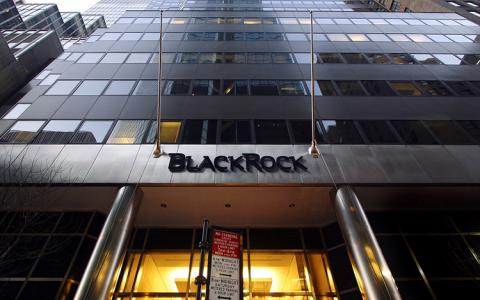
BlackRock Inc. Chief Executive Officer Larry Fink says he sees the highest U.S. inflation in recent memory as more than a transient phenomenon. He backed up that view with a blanket raise for employees.
The world’s largest asset manager will increase the base salaries of all staff at the director level and below by 8%, starting in September, according to a memo he and the firm’s president Rob Kapito issued Wednesday, coinciding with the company’s second-quarter earnings release.
Historic monetary and fiscal stimulus helped the U.S. economy rebound from the depths of the Covid-19 crisis. That recovery has also bolstered BlackRock, which had about $9.5 trillion under management at the end of June. Shares fell 3.3% to $877.85 at 11:27 a.m. in New York.
A giant in indexed products, the company saw its exchange-traded funds exceed the $3 trillion threshold in the second quarter for the first time as investors continued to pile into buoyant global markets.
The policy response has also raised concern that the world’s largest economy could overheat. The U.S. consumer price index surged 5.4% in June relative to a year earlier, and core CPI, which excludes food and energy, jumped by the most since November 1991.
‘Epic Change’
Fink said in an interview with Bloomberg following the company’s earnings release that inflation will bring about “epic change,” and though that’s not necessarily a cause for concern just yet, it’s not as transitory as some market strategists have assumed, either.
“Government policy is more focused on domestic jobs than the cheapest prices today, and I do believe that that will be one of the fundamental changes,” Fink said. “Companies are focusing on their employees more, and I do believe you’re going to see more wage growth that will be above trend line.”
BlackRock is joining a widespread bidding war on Wall Street for younger workers as the firms compete to attract and keep talented employees. Earlier this month, Citigroup Inc. lifted base salaries to $100,000 for first-year analysts, joining the likes of Barclays Plc, JPMorgan Chase & Co. and Guggenheim Partners.
Powell’s View
Meanwhile, Federal Reserve Chair Jerome Powell indicated inflation is likely to remain high in coming months and that the central bank doesn’t plan to scale back its asset purchases yet, in remarks prepared for the House Financial Services Committee on Wednesday.
Fink said the possibility that inflation could persist at as high as 3.5% poses questions for central bankers about historically easy monetary policy and their bond-buying programs.
“If indeed inflation is a little more permanent, how do we evaluate that? Do they raise rates without changing quantitative easing? Do they change how they do quantitative easing? What they do and how they implement it -- to me those are the details that are really going to matter,” Fink said.
BlackRock reported adjusted earnings per share of $10.03 for the second quarter, beating analysts’ estimates of about $9.48 per share. Its revenue of $4.82 billion was higher than projections of $4.6 billion and 32% higher than the same period a year ago.
Fund Flows
A bellwether for the asset-management industry, BlackRock’s results highlighted how investors are adjusting to the current market environment, including a continued appetite for low-cost, easy-to-trade products.
The New York-based company saw a net $75 billion flow into its ETFs, up from about $51 billion in the year-ago period, when individuals began wading back into markets after the worst of the Covid-related shocks in March 2020.
Yet BlackRock has also worked on scaling up its actively managed fund business. Those products, which make up roughly one-quarter of its assets under management but draw about half of its fees, took in a net $62.8 billion in the second quarter.
Another long-term area of focus for BlackRock is China, where the company received a green light from regulators to run a mutual fund business. President Joe Biden’s administration has stepped up a hard-edged policy toward China in recent days, including a plan to warn U.S. companies about operating in Hong Kong, new import controls for the Xinjiang region and talks about a digital trade agreement that would exclude Beijing.
Fink said that with trade between the two countries still strong, he’s unfazed by these kinds of flare-ups.
“This is not like the U.S. and Russia,” he said. “This is a very complex relationship between the U.S. and China,” he added, pointing to BlackRock’s consistency in its goal to expand in the country. “In all my conversations this is considered to be a good thing, because as China expands its markets we want China to have a more open market system.”
Other details from BlackRock’s second-quarter earnings:
The company reported net outflows of $26.5 billion from its equity products in the period, after losing a $58 billion index mandate from a large institutional client.Management-fee revenue of $3.8 billion in the three months ended in June was up 27% compared with the same period a year earlier.Technology services revenue grew 14% year-over-year to $316 million, accounting for about 7% of the firm’s overall income in the quarter.Fink said on the company’s earnings call that he has resumed business travel and that more employees are returning to BlackRock’s New York headquarters, which is open only to vaccinated staff. “I remain cautiously optimistic for a gradual return to having people back in the office,” Fink said. “It was great to be back on the road,” he added. “There is no substitute for meeting face-to-face with people.”
This article originally appeared on Yahoo! Finance.



